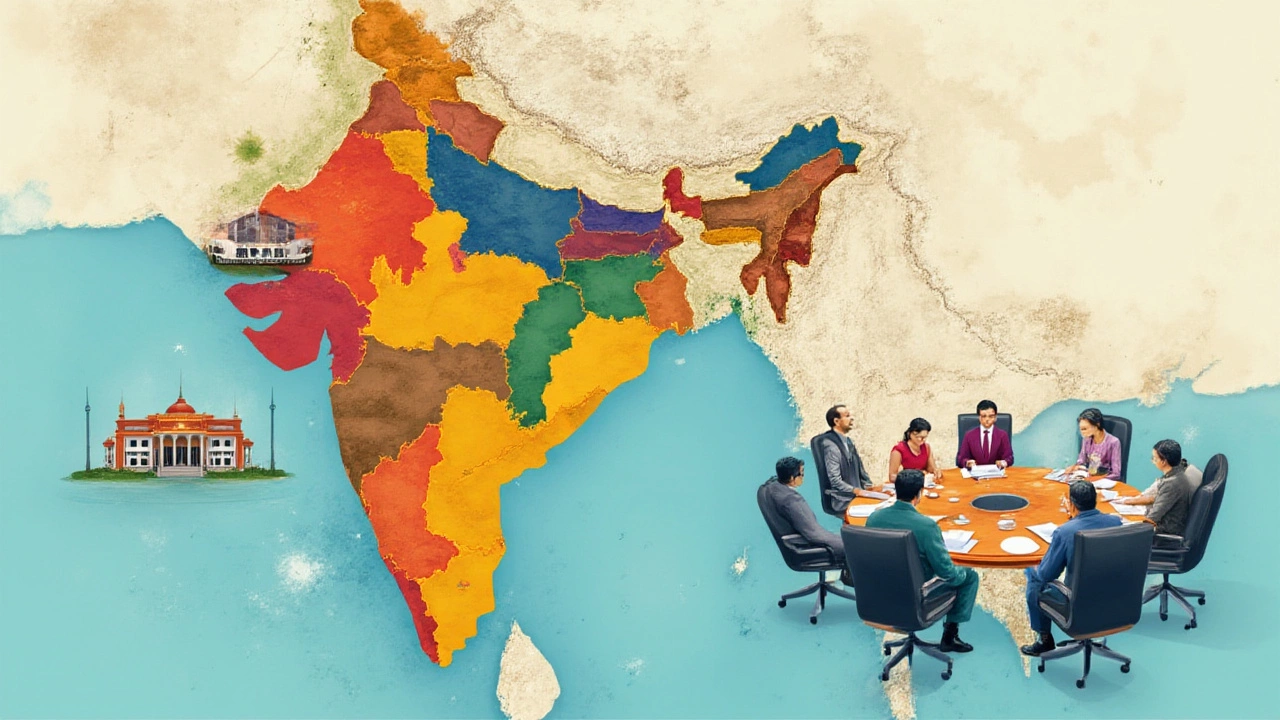Imagine preparing for years to crack one life-changing medical exam, only to see protests erupting against it in different corners of the country. That’s NEET for you. The National Eligibility cum Entrance Test, or NEET, is supposed to open doors for aspiring doctors across India—but not everyone’s buying into it. From Tamil Nadu to Maharashtra, several states have raised their voices against this national exam, arguing it ignores regional realities and creates unfair hurdles. The drama, debates, and court cases around NEET make for a story much bigger than any routine entrance test. Let’s sort out the facts, bust a few myths, and see exactly which states are leading the opposition charge—and why they just won’t back down.
History: How NEET Became the Center of Controversy
NEET first showed up on the Indian education scene in 2013. The idea seemed simple enough: one national test for admissions to pretty much every medical and dental college in India. Before NEET, individual states and private colleges ran their own entrance exams, often in regional languages, giving local students a decent shot. But as soon as NEET became the gold standard, complaints started rolling in. Some worried it quietly favored students from Central Board of Secondary Education (CBSE) backgrounds, pushing state board students to the margins. Others pointed out that coaching culture—already a monster—would only grow more monstrous, swallowing up small-town and rural talent. Of course, there were those who welcomed NEET, hoping it would clean up the wild mess of college admissions and shady capitation fees. But for many, especially in southern India, the exam felt like fresh red tape, thrown over their dreams.
The uproar wasn’t just loud, it was legal. Tamil Nadu led early protests, even challenging NEET in the Supreme Court. For a while, legal back-and-forths led to stays, exemptions, and confusion galore. By 2017, NEET was mandatory across India, but the opposition didn’t simply fade away. Instead, it morphed into a movement with deep political roots. State assemblies passed resolutions, chief ministers fired off letters, and students hit the streets. Underneath it all, a big question lingered: Should a single, national exam decide who becomes a doctor in a country as diverse as India?
Data at the time painted a clear picture: A disproportionate number of successful NEET candidates came from urban centers and upper-middle-class backgrounds. In 2022, government figures showed less than 15% of seats in government colleges went to rural or state-board students in states like Tamil Nadu and West Bengal. The controversy also brought up language differences—while NEET is offered in 13 languages now, some states insist the translations are clunky or riddled with errors. By 2025, it’s clear NEET hasn’t settled into a quiet routine; instead, it’s still making headlines, usually for the wrong reasons.
States Most Actively Opposing NEET
The state with the loudest, most persistent opposition is Tamil Nadu. Year after year, it’s been the poster child for resistance. Leaders across party lines have argued that NEET hurts marginalized groups, especially rural and government school students. In 2021, the Tamil Nadu state assembly even passed a Bill to seek permanent exemption from NEET—hardly a quiet rebellion. The official claim? NEET leads to social injustice and undermines the medical college quota system carefully designed to uplift backward classes. Only a tiny fraction—sometimes less than 10%—of government-school students clear NEET in Tamil Nadu, sparking accusations that the state’s entire medical education model is under threat.
West Bengal is never far behind. Chief Minister Mamata Banerjee fought fiercely against NEET, at one point refusing to implement the exam at all. Though West Bengal now conducts NEET like the rest, skepticism runs deep. State education boards have published studies showing CBSE-background candidates are twice as likely to clear NEET compared to students from West Bengal’s state board. The perception is that NEET sidelines students in less privileged and vernacular-medium schools.
Maharashtra’s opposition is loudest among rural leaders, but it’s there all the same. Politicians cite worries that rural and Marathi-medium students are falling behind because of the standardization NEET requires. The issue often comes up during assembly sessions, channeled by legislators worried about a talent drain as rural kids struggle to keep up. The state also faced massive controversy in 2022 when NEET paper leaks led to exam postponements and more distrust.
Other states have joined the chorus at different times. Andhra Pradesh and Telangana grumbled initially but have mostly come around now. Kerala raised objections on religious and minority education grounds, though it quietly accepted NEET after some legal wrangling. Assam, Odisha, and Karnataka have seen periodic protests but no sustained, broad-based movement to scrap NEET outright. Each state’s resistance depends on how its students perform and how well their languages are represented in the exam.
Here’s a quick table showing specific actions taken by states:
| State | Main Opposition Moves | Result | Current Status |
|---|---|---|---|
| Tamil Nadu | Legislative Bills, mass protests, legal battles | Pending central approval | Strong resistance continues |
| West Bengal | Refused implementation, public rallies, board studies | Now conducting NEET | Skepticism remains |
| Maharashtra | Assembly debates, rural agitation, paper leak uproars | Accepted NEET | Politicians still protest irregularities |
| Kerala | Legal challenges, minority appeals | Accepted NEET | Occasional protests |

Why Some States Oppose NEET: Core Arguments
Dive into the why, and it’s not really just about one test. It’s about access, fairness, and an education system where one-size-fits-all rarely fits anyone. First up, language is a real hurdle. Plenty of rural and urban-poor students in states like Tamil Nadu, Maharashtra, and West Bengal study in regional state boards. When NEET’s main syllabus is close to CBSE, these students feel they’re playing cricket with a tennis bat. Sure, NEET papers are available in multiple languages, but translations aren’t perfect—sometimes a single botched question can kill a student’s chances.
The next big thing: syllabus mismatch. NEET follows the CBSE/NCERT syllabus closely. State syllabi differ, sometimes wildly. For instance, biology chapters that CBSE kids study in Class XI might not show up in Tamil Nadu’s board until Class XII, or vice versa. This creates a genuine disadvantage. NEET coaching has become a billion-rupee industry, but it’s still out of reach for most small-town aspirants. According to a 2023 KPMG survey, over 70% of NEET toppers had attended expensive coaching in metros like Kota, Delhi, or Chennai. Barely 10% of government school NEET candidates had such access.
Reservation systems are also in the crosshairs. Tamil Nadu, for example, has a 69% reservation for OBC, SC, and ST students—way above the rest of India. The state carved out quotas for government school kids too, all of which get muddied by the nationalized nature of NEET. State leaders worry that the local community’s hard-fought gains in social mobility could get reversed in a heartbeat.
Finally, there’s the psychological fallout. Coordinating a national exam is stressful enough, but add to that the threat of paper leaks (like in Maharashtra, 2022), patchy infrastructure, and the ever-present fear of missing cutoffs by a single mark—and you get a hotbed of anxiety. Recent studies by NIMHANS (Bangalore) point out a spike in student distress and suicides linked directly to high-stakes national entrance tests. State governments say that’s a sign NEET isn’t doing its job—and could be damaging the very people it’s supposed to help.
Recent Legal Battles: Where Do Things Stand in 2025?
You might think, with all this noise, things would have settled down by now. But the truth is, arguments around NEET still fill courtrooms and headlines. Tamil Nadu’s fight to opt out of NEET is stuck at the President’s desk, blocked by the central government and mixed legal signals from the Supreme Court. A wave of Public Interest Litigations (PILs) have been filed seeking changes to the NEET process: more regional languages, fairer translations, special cutoffs for government school kids—you name it. None have pushed the government or Supreme Court to roll back NEET, but the pressure’s definitely on.
Court orders since 2022 have clarified some things. Private medical colleges are now fully under NEET, stopping rampant donations and corruption. The Supreme Court has warned against irregularities but held firm: NEET ensures merit and equal opportunity. At the same time, the Court has acknowledged concerns raised by Tamil Nadu and Maharashtra, especially how much NEET feeds into coaching-dependent success. In a 2023 landmark statement, the Court asked the National Testing Agency to improve language translations and keep a stricter check on leakages and administrative goof-ups.
One thing keeps coming up again and again: the federal structure of Indian education. States want more say in how their medical seats are filled. New Bills seeking state-level entrance tests (alongside NEET) have popped up, but so far, none have gained central approval. National medical seats—especially coveted ones in government colleges—must go through NEET as per the Medical Council of India Act, a statute courts refuse to dilute.
As July 2025 arrives, you’ll find frustrated parents, worried teachers, and policymakers all biting their nails over the next legislative or judicial bombshell. Everyone agrees medical admissions need transparency and some kind of standardization—but how you get there, and what a fair system looks like, is the million-rupee question.

What This Means for Students and Parents
If you or your kid are aiming for a medical seat in India, you can’t just ignore these wars over NEET. The test is here to stay, but the rules may shift—sometimes overnight. In states like Tamil Nadu, there’s still hope among politicians that a permanent NEET exemption could happen. For now, though, every single MBBS or BDS seat—whether at AIIMS, a private medical college, or your local government institution—depends on a load of NEET marks. Some states like Tamil Nadu have state-funded coaching classes for government school students, trying to level the playing field, but it’s a long haul.
Tips for students facing this storm:
- Focus squarely on the NEET opposition but don’t count out future changes in test pattern or language support. Stay updated with local news.
- If you’re from a state board, get NCERT textbooks and start bridging the syllabus gap early—ideally from Class XI.
- Keep an eye on state government schemes: some offer scholarships, free coaching, or books for NEET—they do help.
- Don’t skip mock tests. NEET’s biggest challenge is time-pressure, not content. Practice, practice, practice—online if coaching is not accessible.
- Stay mentally healthy. If the stress gets too much, seek help from school counselors or online helplines.
On the flip side, parents should push for clarity and transparency—there’s no harm in joining local parent associations or social media forums that track changes in NEET policies. Also, check if your district has free or subsidized NEET coaching supported by the state. These programs have helped thousands, especially in Kerala and Tamil Nadu, crack the code.
And don’t get caught up in rumors—check only official National Testing Agency, state board, or government updates. Plenty of misinformation floats around every NEET cycle, from canceled exams to new quotas, and it can rattle even the most confident student.
